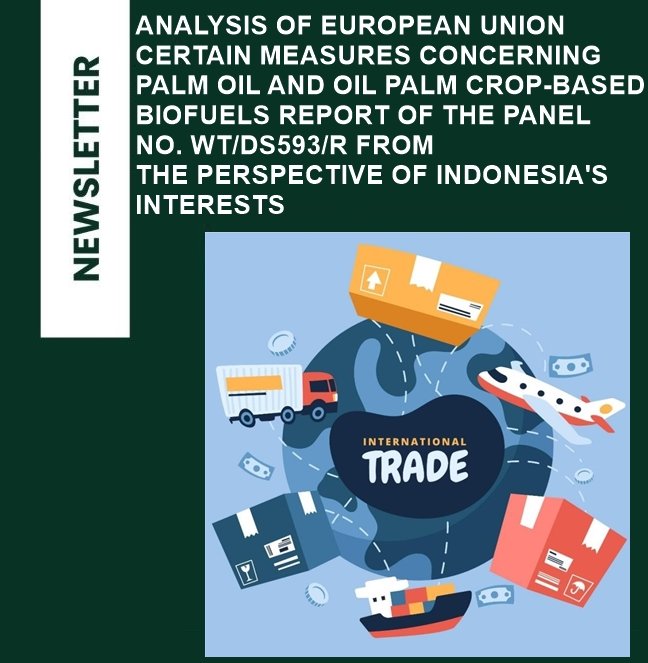From : A.M Oktarina Counsellors at Law
Contributors : Pramudya Yudhatama, S.H., C.L.A., Khaifa Muna Noer Uhdina, S.H., and
Hana Khairunisa, S.H.
Reviewer : Noverizky Tri Putra Pasaribu, S.H., L.L.M (Adv).
- A. Background
Looking at international trade regulations, it cannot be separated from the products to be sold. In this case, the Republic of Indonesia has played an important role in the international trade arena. One of the mainstay commodities is palm oil. However, one of the export destinations for Indonesia, namely the European Union, implements regulations that “protect” its member states through several regulations issued. Thus, Indonesian palm oil products are subject to different legal enforcement, starting from their specifications and taxation. For this, the Indonesian government took legal steps and forwarded this matter to the World Trade Organization (“WTO”). After running, finally a panel report from the WTO was issued that benefited Indonesia. So, what are the points that benefit Indonesia? Let’s see the explanation below:
- Legal Basis
- General Agreement on Tariffs and Trade 1994 (“GATT”);
- Technical Barriers to Trade (“TBT”).
- Taxe Incitative Relative à l’Incorporation de Biocarburant (“TIRIB”);
- Directive (EU) 2018/2001 of the European Parliament and of the Council of 11
December 2018 on the promotion of the use of energy from renewable sources (recast), OJ 2018 L 328, p. 80 (“RED II”);
- European Union – Certain Measures Concerning Palm Oil And Oil Palm Crop-Based
Biofuels Report Of The Panel No. WT/DS593/R (“Report DS593”)
Recently, social media has been enlivened with the results of the DS395 decision published by the
WTO. This more or less affects Indonesia’s position. In terms of events, previously on December
9th, 2019, Indonesia requested consultation with the European Union regarding certain measures imposed by the European Union and its member states regarding palm oil and palm oil-based biofuels from Indonesia.
Through the panel process, in which several countries participated in the process, the object of discussion was the categorization of palm oil and biofuels. This is driven by the intention of the European Union to protect biofuels based on rapeseed oil and domestic soybean oil. However, this makes a difference with Indonesian palm oil.
This restriction is carried out by the European Union which has implemented restrictions on the risk of high indirect land use change (“ILUC”) and phased it out. However, this is done inconsistently and contrary to the TBT Agreement, precisely in Article 2.1. which reads:
“Members shall ensure that in respect of technical regulations, products imported from the territory of any Member shall be accorded treatment no less favourable than that accorded to like products of national origin and to like products originating in any other country.”
Furthermore, this is also an extension of the provisions of RED II, precisely in Article 26, which reads:
“Member States should ensure that renewable energy communities can participate in available support schemes on an equal footing with large participants. To that end, Member States should be allowed to take measures, such as providing information, providing technical and financial support, reducing administrative requirements, including community-focused bidding criteria, creating tailored bidding windows for renewable energy communities, or allowing renewable energy communities to be remunerated through direct support where they comply with requirements of small installations.”
Therefore, looking at one of the above provisions, which is finally correlated with the Taxe Incitative Relative à l’Incorporation de Biocarburant (“TIRIB”), it can be seen that there is discrimination from palm oil-based biofuels from the eligible biofuel group, so there is a different taxation mechanism. This causes differences in regulations, where there are the same types.
Judging from the results of the report, of course, this is an aspect of injustice and discrimination in market trading practices. Thus, in the end, the WTO panel recommended that the EU align its measures with its obligations under the TBT Agreement and GATT 1994 to the extent that it has not yet done so. This certainly revives the hope of Indonesian palm oil to compete in the European market. (Vide Report DS593)
- C. Conclusion
Palm oil, has a competitive selling value, for this too, Indonesia as one of the producers, has begun to penetrate foreign markets. Rather than the effort, of course, it will look at the regulations and provisions that exist in the destination country. Therefore, seeing the injustice in the sale and imposition of this tax, Indonesia took legal remedies through the WTO. Indonesia has finally succeeded in proving that the European policy of categorizing palm oil as a “high ILUC-risk”
product is a protectionist step that disguises trade interests as an environmental issue. So that this is an achievement and makes it easier for Indonesia to make sales efforts in the future.
For further information, please call:
– 0817779122

